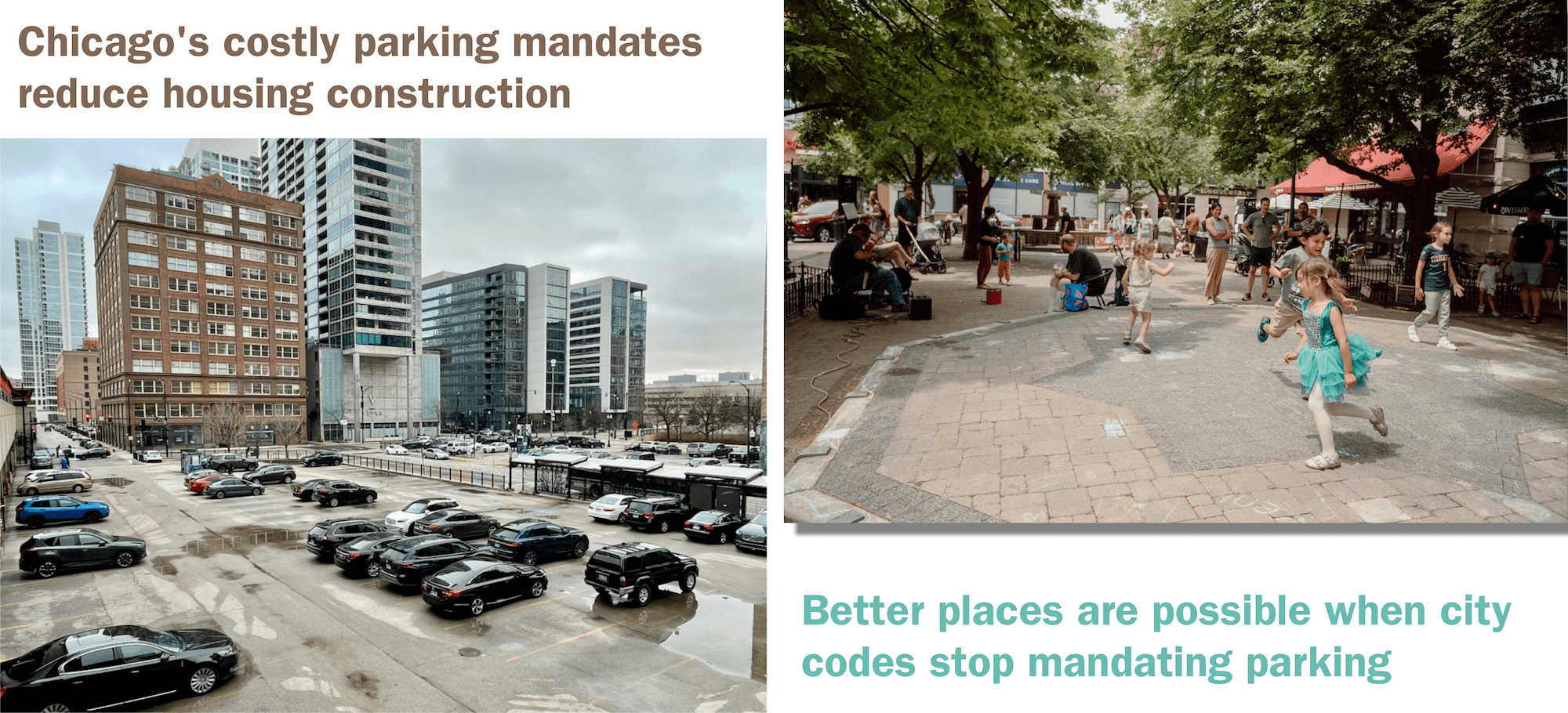
Open Letter
We're a group of grassroots, professional, and civic groups in Chicago working to end parking mandates in Chicago. Parking mandates are a regressive, inflexible, and outdated policy of requiring a fixed amount of parking spaces to be built with any new commercial or residential development, even when the development is in an area (or serving a population) not expected to use the parking.
Parking mandates harm Chicago in many ways that are subtle but significant, and removing parking mandates from the city's code would benefit Chicagoans in many ways, including:
- Reducing living costs in Chicago
- parking spaces are expensive to build, both directly (e.g., the concrete and labor needed to build the space) and indirectly (e.g., a space that must be set aside for parking is space that can't be used for another apartment or more commercial floor space). These expenses then get passed along to the people looking for a place to live or trying to buy groceries or other necessities.
- Improving the city's debt crisis
- Chicago is infamously in a budget crisis, and having to choose between cutting city services and raising property taxes (again). However, a third option out of the crisis is to encourage new homes and businesses in the city, increasing the city's tax base and reducing the tax burden on current Chicagoans. Removing parking mandates is a simple, high-impact step Chicago could take to simplify the city code and make it easier, faster, and less uncertain to build in Chicago.
- Supporting Chicago's environment
- Parking mandates restrict Chicago to a car-centric future, at a time when we need to encourage and support transit alternatives. Cars bring environmental harm, safety risks, and infrastructure costs. For many reasons, Chicago should be working to make it as safe, comfortable, and convenient to take the bus, train, walk, or bike as it is to drive a personal car. Ending parking mandates would be a significant step in this direction.
Parking mandates might seem like a small policy, but it's a policy choice that has a huge impact on the city's environment, economy, and culture. Removing parking mandates would help bring more (and more affordable) housing, help solve the city's budget crisis, and overall make the city a more pleasant place to live. Better still, unlike many other development options, removing parking mandates can be done at no cost to Chicagoans.
We urge Chicago's Mayor and Alder-people to join other American cities (like Austin and New York) and end parking mandates in Chicago in 2025.
Take Action
Write to Chicago City Council
Sign a petition asking Chicago's city council to removing parking mandates.
Sign the petitionUpdates
Parking reform adopted on July 16, 2025
City Council eliminated parking mandates in about 74 percent of Chicago, for properties in all zoning districts that are near CTA stations and select CTA bus corridors.
View the mapBusting Parking Reform Myths
Myth 1: Eliminating parking requirements means there will be no parking at all
Removing parking mandates doesn't eliminate parking. Instead, it allows property and business owners to decide how much parking to provide based on demand. Most cities, including Chicago, still have plenty of parking after reducing or eliminating parking mandates; the difference is that any new parking is built in response to customer and tenant needs rather than government-imposed minimums.
Myth 2: Ending parking requirements will make parking impossible to find
Studies show that most cities have more parking than they need. Reducing oversupply can balance demand, while freeing up land for housing, businesses, and public spaces. Additionally, reforms often encourage better parking management, like shared lots or pricing strategies that improve availability.
Myth 3: Eliminating parking requirements hurts businesses
Business owners who believe their business needs a lot of car parking will locate on a property with enough of it, or build their own. In fact, the vast majority of businesses in Chicago have not been required to provide car parking for twenty years or more. Parking reform is necessary to eliminate mandates for the remaining businesses that are still required to provide parking, including beyond what the business owner would naturally provide.
Supporting Organizations
- Abundant Housing Illinois (previously Urban Environmentalists Illinois)
- Active Transportation Alliance
- Better Streets Chicago
- Chicago Coalition to End Homelessness
- Chicago, Bike Grid Now
- Commuters Take Action
- Elevated Chicago
- Parking Reform Network
- Shared-Use Mobility Center
- Sierra Club Chicago
- Strong Towns Chicago
- The Southwest Collective